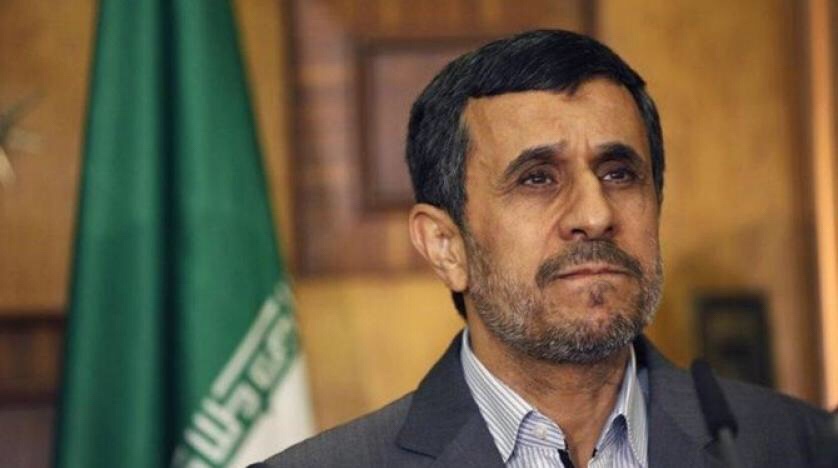
Ahmadinejad Asks Rouhani to Resign
Friday, 10 August, 2018 - 08:15 -
File photo of former Iranian President Mahmoud Ahmadine...
London - Asharq Al-Awsat
Former Iranian president Mahmoud Ahmadinejad has asked President Hassan Rouhani to resign.
In a video published on his official website, Ahmadinejad said Rouhani, the Larijani brothers and the conservative and reformative blocs are responsible for the current situation in Iran.
The return of calm hinged on the three authorities stepping down, he said.
Ahmadinejad said that Rouhani is not accepted by the Iranians, posing the question of 'Who is responsible for the current situation in the country?'
Five years have already passed, and the economy in the country is collapsing – the confidence in the regime is almost at zero level, he said. Ahmadinejad added that the people don’t want Rouhani and his presence undermines the country. He implicitly hinted at the nuclear deal, saying that it offered privileges but the people received nothing.
This is the second time in six months that Ahmadinejad demands the heads of the three authorities to resign. In February, Ahmadinejad responded to a speech delivered by Iranian supreme leader Ali Khamenei on the delay of social justice and the necessity of apologizing to the Iranians 39 years after the Iranian revolution.
Ahmadinejad called on Khamenei to take tangible steps given his position and vast powers in the regime, in order to maintain the confidence of the public – he demanded to amend the constitution and to hold quick and free presidential and parliamentary elections.
The demands of Ahmadinejad coincide with the return of US sanctions and the renewal of popular protests. He finds himself comfortable in renewing his demands, especially that it was confirmed last week that Rouhani would appear in front of the parliament to answer questions on his government’s handling of Iran’s economic struggles.
Two pro-regime clerics Hossein Noori Hamedani and Naser Makarem Shirazi criticized the government and the judiciary over the slow pace in dealing with corruption files.
Larijani said Wednesday, after withdrawing confidence from the Iranian minister of labor, that it is a shame that launching accusations has become a trend, hinting at speeches delivered by Ahmadinejad in a number of cities in Iran.
Iranian government efforts to confront the country’s worsening economic crisis have backfired and things are likely to get worse after the US reimposed sanctions on the country following its withdrawal from the 2015 nuclear deal between Tehran and world powers.
The government sought to stabilize the currency by pegging it at a set rate to the dollar but this measure ended up speeding the rial’s decline, Bloomberg said.
The rial’s value has gone down down 70 percent since May.
In the runup to the Aug. 7 resumption of US sanctions, President Hassan Rouhani got stern directives from a few corners of Iran.
Supreme Leader Ali Khamenei urged him to deal with corruption. The Revolutionary Guards commander told him to focus on Iran’s slumping currency, while a sizable chunk of Parliament summoned Rouhani to harangue him about the sinking economy. None of them, however, had any advice on how to ease the growing sense of despair and outrage in the streets, reported Bloomberg.
Over the past few weeks, there has been a 50 percent rise in the price of some food items, triggering scattered protests.
Fawaz al-Elmi, an expert in international trade, told Asharq Al-Awsat that Iran will likely “face the worst of scenarios.”
“The US sanctions will have severe repercussions on the Iranian economy,” he said, adding that 105 international companies have withdrawn from the Iranian market and the riyal has lost another 12 percent of its value since the sanctions have gone into effect on Tuesday.
Only three years after the nuclear deal was signed, though, instead of enjoying the fruits of the accord, Rouhani has to explain what went wrong—and how he’s going to fix it
To some observers, Rouhani’s attempts to deal with the situation have been reactionary and not part of a coherent strategy. “They’re dealing with crises as they happen,” Saeed Laylaz, a pro-reform economist who has advised the government, told Bloomberg.
“The people have lost their trust, and they are craving efficiency. They don’t care if it comes from men with beards (religious figures in Iran) or neckties.”
Rouhani has governed as a moderate. He now finds himself on precarious middle ground. To the right, he faces pressure from conservative clerics who were critical of the nuclear deal to begin with. On the left, he’s blamed for not doing enough to reform the political or economic system during the two years the deal was in effect. Progress was made—oil exports surged, for example—but job creation couldn’t meet demand in a country where more than 60 percent of the population is under 30.
No comments:
Post a Comment